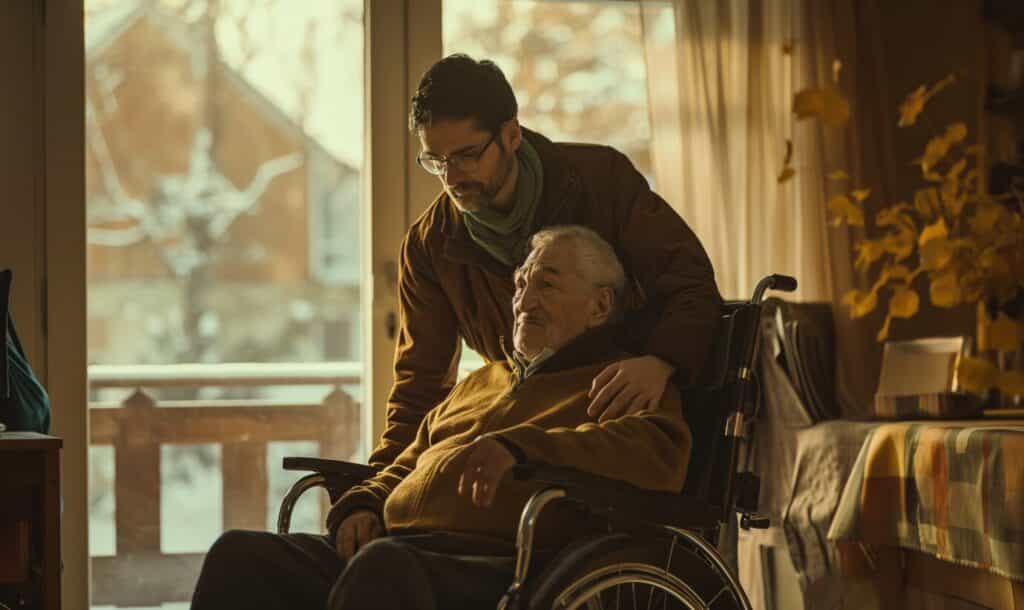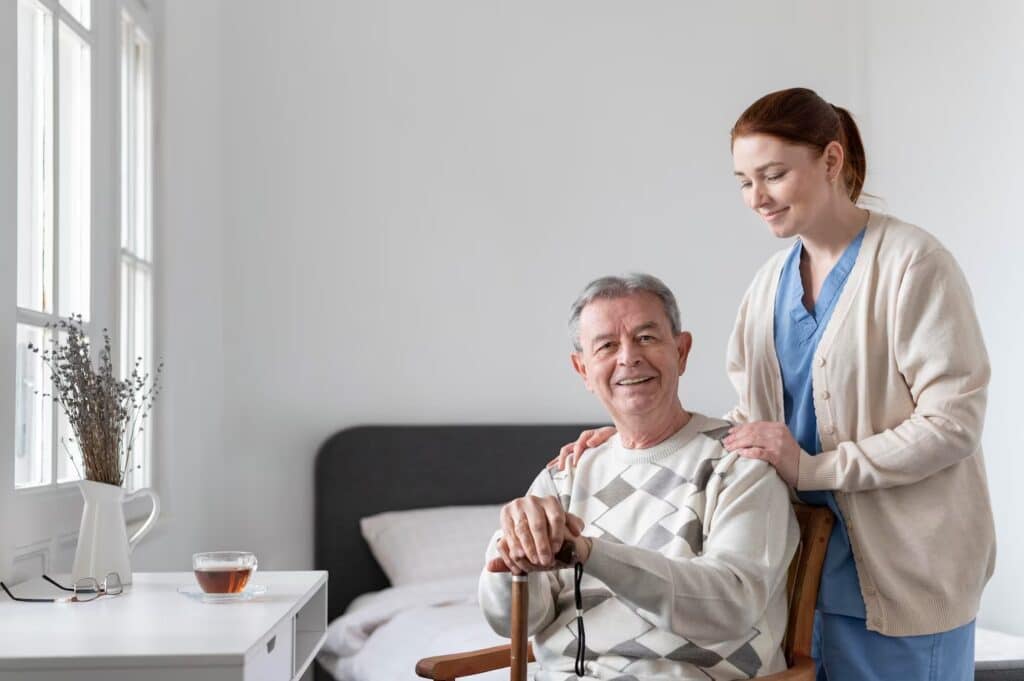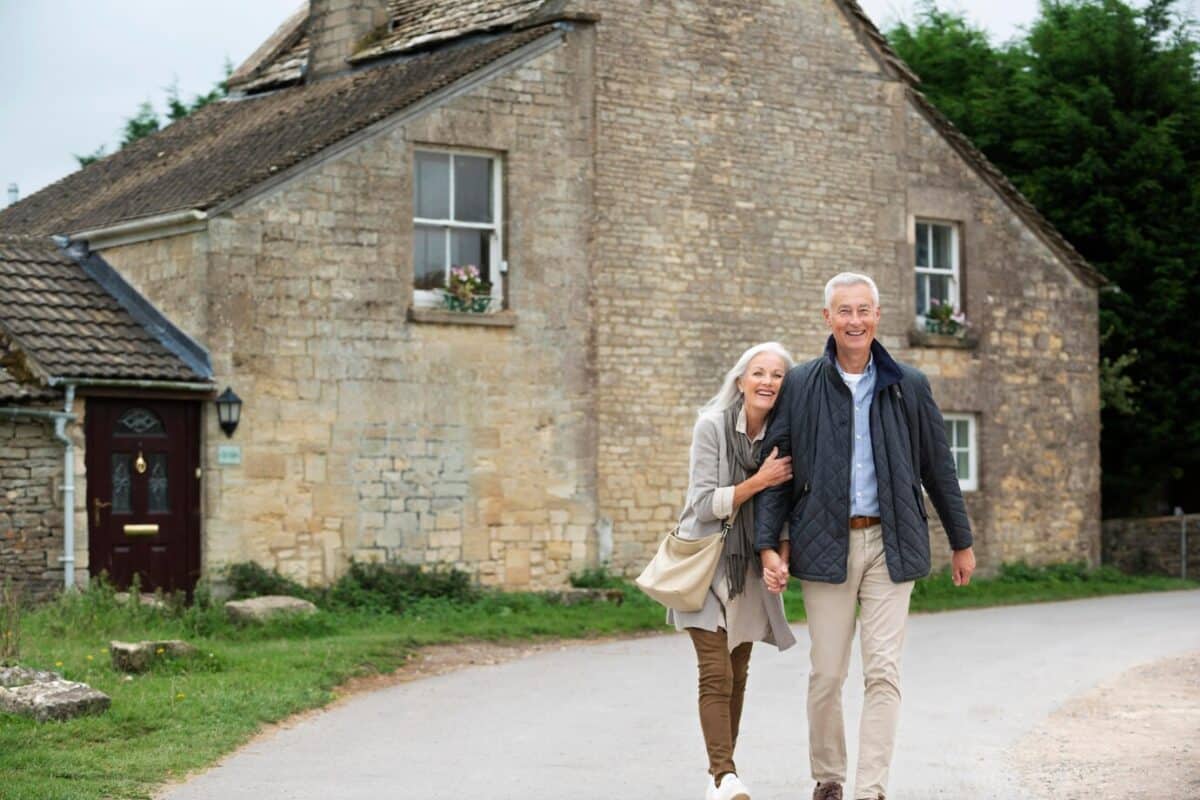Services Offered at Westmont of La Mesa
At Westmont of La Mesa, a haven of customized services awaits you, tailored to elevate your comfort, well-being, and lifestyle with various personalized amenities catered to meet your needs.
Services include dining options tailored to diverse tastes using fresh, high-quality ingredients in a welcoming atmosphere. Enjoy pristine housekeeping and maintenance, personalized care plans, efficient transportation services, and wellness programs promoting mental and physical health.
All these inclusive offerings guarantee a comfortable and enriching living experience at Westmont of La Mesa, where your well-being is our top priority.
Key Takeaways
- Personalized care plans tailored to individual wellness needs.
- Dining services offer diverse menu options with high-quality ingredients.
- Housekeeping and maintenance ensure impeccable cleanliness and organization.
- Transportation services with efficient scheduling and experienced drivers.
- Wellness programs provide mental health workshops, social activities, and on-site medical services.
Dining Services
At Westmont of La Mesa, our dining services are designed to provide residents with a delightful culinary experience that caters to their individual preferences and dietary needs. Our menu options are crafted with care and attention to guarantee a variety of choices that meet the diverse tastes of our residents. Whether you have specific dietary requirements or enjoy exploring new flavors, our culinary team is dedicated to creating meals that excite your palate.
Our menu options range from hearty comfort foods to light and refreshing dishes, thoughtfully curated to offer something for everyone.
You can look forward to enjoying each meal in a warm and inviting atmosphere that enhances the overall dining experience. Our chefs take pride in using fresh, high-quality ingredients to prepare delicious meals that nourish the body and delight the senses.
Experience the joy of exceptional dining at Westmont of La Mesa, where every meal celebrates flavor and culinary expertise.
Housekeeping Assistance
To guarantee that residents at Westmont of La Mesa experience a comfortable and well-maintained living environment, our housekeeping assistance services are designed to provide impeccable cleanliness and organization throughout your living space.
Our dedicated team of housekeeping professionals is committed to ensuring that your residence is always in top condition, allowing you to focus on enjoying your time here.
We understand that a clean living space is essential for your well-being, so we employ practical housekeeping tips and cleaning techniques to maintain a pristine environment.
From dusting and vacuuming to bathroom sanitation and bed-making, our team pays attention to every detail to uphold the highest standards of cleanliness.
Personal Care Plans
Regarding your Westmont of La Mesa care, we understand the significance of personalized wellness plans tailored to your needs. Our team collaborates closely with you to develop customized care options catering to your needs and preferences. With individualized attention and all-encompassing support, we prioritize your well-being at every step.
Engage in regular physical activities such as walking, swimming, or tai chi to enhance mobility and strength, and maintain a balanced diet of fruits, vegetables, lean proteins, and whole grains for overall health.
Customized Care Options
Numerous Westmont of La Mesa residents benefit from our personalized care options, also known as Personal Care Plans. We grasp the significance of customized care plans to meet resident preferences and provide tailored support for individual needs. Our dedicated team works closely with each resident and their family to create a detailed care plan that addresses specific requirements and preferences.
At Westmont of La Mesa, we pride ourselves on offering a wide range of customized care options to ensure that each resident receives the personalized care they deserve.
Whether it’s assistance with activities of daily living, medication management, or specialized care for specific health conditions, our staff is trained to provide compassionate and professional support.
Individualized Wellness Programs
Tailored to meet your unique wellness needs, the Individualized Wellness Programs at Westmont of La Mesa, also known as Personal Care Plans, are meticulously crafted to prioritize your health and well-being. These personalized plans are designed with specific requirements, guaranteeing a holistic approach to your overall wellness journey.
Here are three critical components of our Individualized Wellness Programs:
- Personalized Fitness: Our dedicated team works with you to create a customized fitness regimen that caters to your abilities and goals, helping you stay active and energized.
- Nutritional Counseling: Receive expert guidance on nutrition tailored to your dietary preferences and health needs. This will empower you to make informed choices for a balanced and healthy lifestyle.
- Regular Monitoring and Adjustments: Your Personal Care Plan is regularly reviewed and adjusted as needed to guarantee it continues to meet your evolving wellness requirements effectively.
Experience the benefits of our Individualized Wellness Programs at Westmont of La Mesa and commence on a personalized path to enhanced well-being.
Transportation Coordination
Regarding transportation coordination at Westmont of La Mesa, you can expect efficient transport scheduling customized to your needs. Our on-demand shuttle service guarantees that you have convenient and reliable transportation options available whenever you need them.
Whether you’re going to a medical appointment or a social outing, our excellent transportation coordination services can help.
Efficient Transport Scheduling
Efficient Transport Scheduling at Westmont of La Mesa guarantees seamless transportation coordination for residents, enhancing their overall experience and convenience. Our commitment to transport efficiency and scheduling confirms that residents can move around effortlessly, allowing them to enjoy all the amenities and activities available in our community.
Here are three critical aspects of our transport scheduling service:
- Personalized Routes: We tailor transportation schedules to fit individual needs, confirming that each resident can promptly access dining areas, recreational facilities, and other services.
- Experienced Drivers: Our professional drivers are dedicated to providing a safe and comfortable journey for all residents, contributing to a stress-free transportation experience.
- Real-Time Updates: Residents can stay informed about transport schedules and changes through our real-time communication system, allowing for better planning and peace of mind.
On-Demand Shuttle Service
Enhance your convenience and accessibility with the On-Demand Shuttle Service at Westmont of La Mesa. Our transportation service is designed to promote resident independence by offering convenient options for community outings. Whether you need a ride to a medical appointment, shopping trip, or social event, our shuttle service is here to assist you.
| Transportation Convenience | Accessibility Options |
| On-Demand Scheduling | Wheelchair Accessible |
| Door-to-Door Service | Personal Support |
| Regular Community Outings | Available Accommodations |
| Friendly and Experienced Drivers | Tailored Routes |
Our shuttle service ensures easy access to essential services and activities. It fosters a sense of community by organizing group outings and excursions. At Westmont of La Mesa, we prioritize your comfort and safety, providing a reliable transportation solution that aligns with your needs and preferences. Experience the freedom to explore the world with our all-inclusive On-Demand Shuttle Service.
Wellness Programs
To promote all-encompassing well-being and cater to residents’ health needs, Westmont of La Mesa offers extensive wellness programs. These programs enhance physical health, mental well-being, and overall quality of life.
Here are some critical components of the wellness programs at Westmont of La Mesa:
- Fitness Classes: Residents can participate in various fitness classes tailored to different levels and interests. From gentle yoga sessions to energizing Zumba classes, there’s something for everyone to stay active and fit.
- Nutritional Counseling: Professional nutritionists are available to provide personalized guidance on healthy eating habits and meal planning. Residents can receive one-on-one consultations to address specific dietary needs and goals.
- Mental Health Workshops: Westmont of La Mesa organizes workshops and seminars on stress management, mindfulness, and emotional well-being. These sessions offer valuable tools and strategies to help residents maintain a positive outlook and cope with challenges effectively.
Social Activities
Continuing the focus on holistic well-being, the social activities at Westmont of La Mesa play an essential role in fostering connections, creating a sense of community, and enriching residents’ lives. Activity selection at Westmont is diverse, catering to various interests and preferences.
From arts and crafts sessions to fitness classes, there’s something for everyone to enjoy. Group outings are also a highlight, providing opportunities for residents to explore the local area, attend cultural events, or enjoy a picnic in the park together. These outings offer a change of scenery and encourage social interaction and bonding among residents.
The social activities calendar is thoughtfully planned to promote a balance of stimulating and relaxing events, enhancing mental and emotional well-being. By participating in these activities, residents can form meaningful relationships, stay active, and maintain a sense of purpose and belonging within the Westmont of La Mesa community.
Medication Management
Effective medication management is critical to the thorough care provided at Westmont of La Mesa. Our community prioritizes the safety and well-being of residents, guaranteeing that medications are administered accurately and responsibly. To achieve this, we implement stringent safety protocols and invest in continuous staff training to ensure the highest standards of care. Here are crucial elements of our medication management approach:
- Individualized Medication Plans: Each resident receives a personalized medication plan tailored to their needs, promoting effective treatment and minimizing the risk of adverse reactions.
- Regular Medication Reviews: Our dedicated team conducts regular reviews of medication regimens to confirm they remain appropriate and effective, adjusting as needed to accommodate any changes in health status.
- Medication Administration Training: Our staff undergoes thorough training on proper medication administration techniques, including dosage accuracy and monitoring for potential side effects, to uphold our residents’ highest level of care and safety.
On-site Medical Services
Access to on-site medical services is foundational to our all-encompassing care approach for Westmont of La Mesa residents. Our community prioritizes the well-being of our residents by fostering healthcare partnerships that guarantee excellent medical care. Through these collaborations, we provide a seamless connection to a network of trusted medical professionals who meet your health needs with expertise and compassion.
At Westmont of La Mesa, we take a proactive approach to healthcare by offering wellness initiatives that promote a comprehensive view of well-being. Our medical staff is highly trained and committed to delivering personalized care tailored to your needs. Whether you require routine check-ups, medication management, or specialized treatments, our team supports you every step.
Additionally, we grasp the importance of convenience and accessibility in healthcare. That’s why we offer telehealth options for virtual consultations, ensuring you can receive medical attention promptly and conveniently.
Rest assured that your health and wellness are our main priorities at Westmont of La Mesa.
24/7 Emergency Response
In emergencies, swift and reliable response is essential to ensuring the safety and well-being of our residents at Westmont of La Mesa. At our community, we prioritize emergency preparedness and quick response to address any unforeseen situations effectively. Our commitment to strict safety protocols and first aid training underscores our dedication to providing excellent care for our residents. Here are some critical aspects of our emergency response:
- Emergency Preparedness: We’ve detailed emergency plans to handle various scenarios promptly and efficiently.
- Quick Response: Our staff is trained to act swiftly in emergencies, ensuring that help reaches our residents immediately.
- Safety Protocols: We adhere to strict safety procedures to maintain a secure environment for all residents.
At Westmont of La Mesa, you can have peace of mind knowing that our team is well-equipped and prepared to handle any emergency with care and expertise.
Final Thoughts
To sum up, Westmont of La Mesa offers a thorough range of services to cater to each resident’s unique needs. From dining and housekeeping assistance to personalized care plans and wellness programs, our community is dedicated to providing high-quality care and support. With on-site medical services, 24/7 emergency response, and various social activities, residents can enjoy a fulfilling and comfortable lifestyle at Westmont of La Mesa. Choose us for exceptional care and peace of mind. Contact us at 619-369-9700.





































